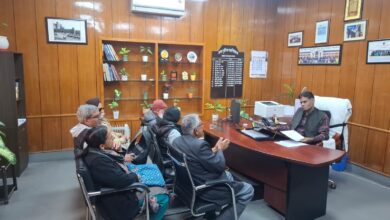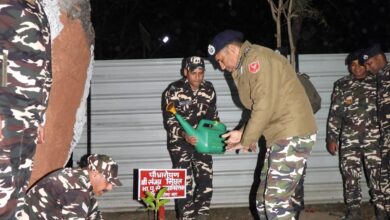India should resolve border dispute with China for lasting peace in the region, LOC be turned into international border in J&K with Pakistan: Prof. Ishtiaq Ahmed

India should resolve border dispute with China for lasting peace in the region, LOC be turned into international border in J&K with Pakistan: Prof. Ishtiaq Ahmed
S.M.A.KAZMI
Dehradun, March 21
Dr. Ishtiaq Ahmed, Professor Emeritus, Stockholm University, Sweden who is a famous author and political scientist of Pakistani descent has called upon India to resolve its’ border dispute with China for a lasting peace in the entire region.
Participating in a talk and discussion on the subject of “Building peace between India and Pakistan- a challenge worth taking up” at Doon Library and Research Centre here today, Dr. Ishtiaq Ahmed was of the opinion that the bigger problem facing India is its’ border dispute with China. He said that if India is able to resolve its’ border dispute with China than Kashmir dispute which is the major hurdle in the peace between India and Pakistan could be solved.
“Following drying up of financial resources of Pakistan from America and Saudia Arabia, China is the their only source left. Pakistan is a sidekick and could be tackled if dispute with China is resolved amicably by India,” he said.
The talk by Prof. Ishtiaq Ahmed was moderated by Dr. Sanjeev Chopra, a former IAS officer and former Director of Lal Bahadur Shastri Academy of Administration,Mussoorie. Prof. Ishtiaq and his wife were welcomed by Prof. B.K. Joshi, Director,Doon Library and Research Centre.
He wondered that wisdom of centuries old Chinese and Indian civilisations is of no use if both these countries fail to resolve their difference. Asked about ceding of Aksai Chin area of J&K by Pakistan to China, Prof. Ishtiaq Ahmed said that India should be realistic in its approach while dealing with China on the border dispute. He further said that it was a fact that the Aksai Chin area was never under Indian Control and it has been stated in the book written by Avatar Singh Bhasin also.
Praising the Indian statesmanship after independence for pursuing the path of non-alignment and following national interest on priority, he said that India should refrain from doing bidding at American behest of taking on China. The famous author said that despite being ‘All Weather Friend’ of Pakistan, China has never stopped trade with India which is in their national interest.
Regarding Kashmir dispute, Prof. Ishtiaq Ahmed said that Pakistan has been following an unrealistic approach and called for declaring Line of Control (LOC) in J&K as international border. Talking about people to people relations between two countries, Prof. Ishtiaq said that people of both sides of Punjab who suffered the most during partition riots have since long realised that partition was imposed upon them and they were helpless victims but there has been no rancour between common people despite suffering immensely.
He said that social media has played a positive role in the betterment of the people to people contact and better understanding each other. He called upon the intellectuals of both the countries to work for peace which is only way to solve the burgeoning problems of environment, water scarcity, climate change, terrorism and drug abuse facing the vast majority of these countries. “ War is no solution as both the countries have nuclear arms,” he added.
He said that the four point peace initiative of Parvez Mussahraf- Manmohan Singh which called for turning LOC into international border to be followed with porous border between both the parts of of J&K was a workable solution.
Asked about his book ‘Pakistan-a Garrison state’ and continued hegemony of Pakistani army in it’s politics. Prof. Ishtiaq said that undoubtedly army has been very powerful and controlling the polity since 1958 following the take of power by General Ayub Khan but the people have started resisting and criticising the garrison state even in the Punjab state which was the stronghold of Pakistani army. The events of May 9, 2023 clearly indicate the resentment of common people with the army.






